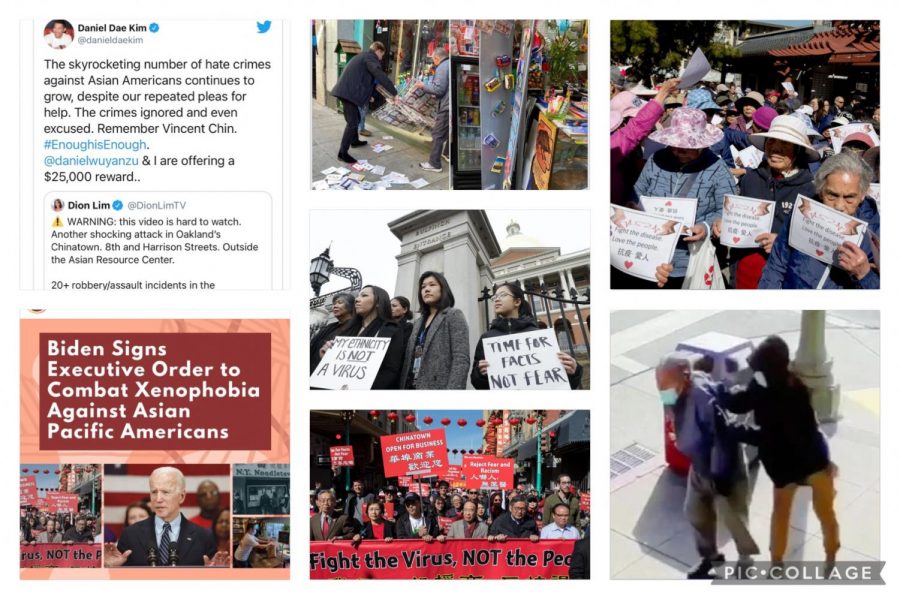COVID-19: Racism Towards Asian Americans
Xenophobia and hate crimes against the Asian community have significantly increased since Covid-19. It is important to address these recent incidents and educate those who remain in the dark.
March 1, 2021
Since the early stages of the COVID-19 pandemic, significant racial and ethnic inequities have persisted across the continuum of COVID-19 morbidity, hospitalization, and mortality. From this we see a surge of prejudice and discrimination, prescribing an “otherness” to disease to feel protected and ascribing blame to justify prejudicial rhetoric. This stigma has recurred throughout history: Jewish persecution during the Black Death, LGBTQ communities during the rise of HIV, and people of West African descent during the Ebola outbreak.
Misinformation and conspiracy theories that Chinese people are responsible for the COVID-19 pandemic have led to organizations being created to help protect those who are being discriminated against. East Asian individuals have been unfairly targeted for discrimination and bias partially due to the virus first being identified in Wuhan, China. Presently, Asian individuals have been unfairly targeted by being accused of having COVID-19 when expressing normal, non-illness-related coughing or sneezing and when demonstrating symptoms of a common cold or seasonal flu. Chinese communities faced vandalism and plummeting business as sensationalist headlines and bigots leaped to the unproven conclusion that Chinese eating habits were to blame for the first reported cases of the coronavirus outbreak, linked to a Wuhan wet market. President Donald Trump repeatedly referred to the coronavirus as the “Chinese virus,” “Wuhan virus,” and “Kung flu” and vowed to “make China pay” for the pandemic, despite news of increasing incidents of harassment and attacks
However, The backlash is not limited to Chinese people. East Asians, Southeast Asians, and Pacific Islanders have also become recipients of this anti-Chinese violence stoked by Trump’s rhetoric. Similarly in the 2014 Ebola outbreak, Africans living in the U.S. reported a backlash that ranged from hurtful questions to outright assault. COVID-19 is no different. Xenophobia is not limited to infectious disease outbreaks, either. After the September 11th attacks, violence and threats against Arab Americans, Muslim Americans, Sikh Americans, South Asian Americans, and others perceived to be of Middle Eastern origin followed.
On Sep. 17, 2020, despite 164 Republican members voting against the measure, the House of Representatives passed a resolution that asked “public officials to condemn and denounce anti-Asian sentiment, racism, discrimination, and religious intolerance related to COVID-19” and encouraged officials to take specified steps to document and combat anti-Asian discrimination.
“Since the beginning of the coronavirus pandemic, Asian Americans have been forced to endure demeaning and disgusting acts of bigotry and hate, consisting of everything from verbal assaults to physical attacks.”…”The House needed to take a strong and public stand against this appalling intolerance, discrimination, and violence that has taken place all across the country during this public health crisis, and today it did just that.” Democratic Rep. Grace Meng of New York, who introduced the resolution, said in a statement after its passage.
In the end, socially entrenched racism and xenophobia toward Asian Americans have repetitively recurred through individual-level prejudiced attitudes and actions. Moreover, these attitudes and actions have been reinforced by institutional-level support during times of crisis or great change, including the coronavirus pandemic. Unfortunately, the pandemic-related stigmatization of Asian Americans and Asians across the globe may continue long after the cessation of COVID-19. Americans must confront incidents of discrimination head-on: in schools, workplaces, businesses, and public spaces, in addition to demanding a robust response from law enforcement and the federal and state governments when hate crimes occur.



















